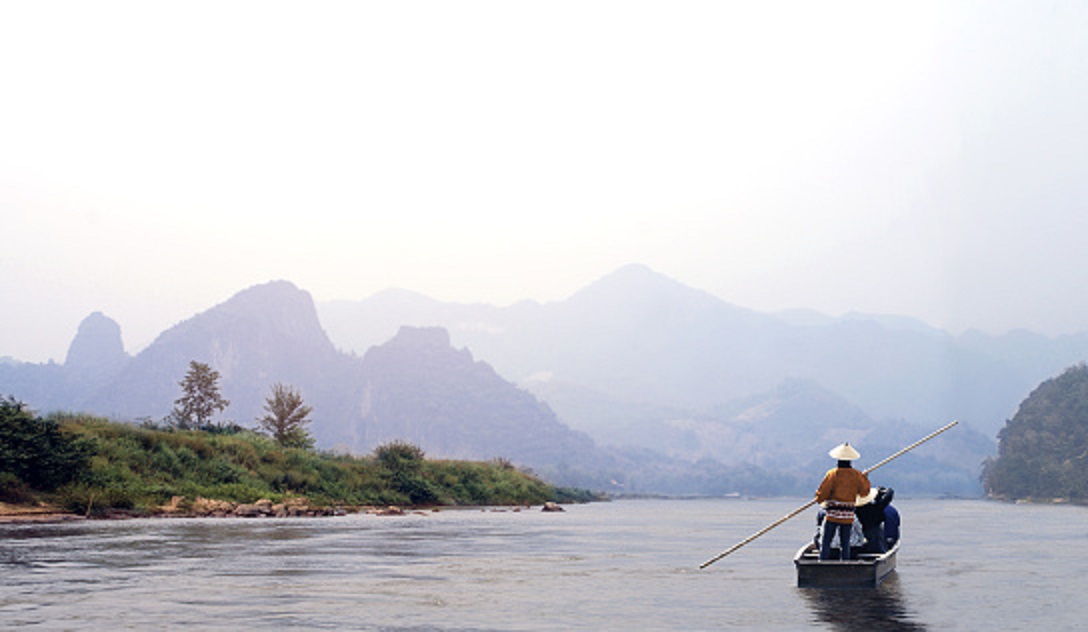Rosewood, known for its dark red colour and dense bark, has traditionally been used to make furniture and is worth tens of thousands of dollars per cubic metre. Nearly all rosewood logs are sent to China, where rosewood furniture is hugely popular, generating unsustainable demand.
UN-REDD and a UN Decade for Ecosystem Restoration launched a campaign targeting urban consumers in China. The campaign aims to shift consumer behaviour away from rosewood to sustainably sourced wood products.
“Improved forest governance, trade and investments are important to address illegal logging, trafficking and other forms of forest crimes in the region,” said Mario Boccucci, Head of UN-REDD Secretariat. “An innovative UN-REDD initiative on sustainable forest trade in the Lower Mekong region (UN-REDD Lower Mekong Initiative) was developed to support progress on this issue.”
 Technical experts from the UN-REDD Lower Mekong Initiative and Thailand’s Royal Forest Department meet with local community leaders in Ubon Ratchatani, Thailand to talk about how to engage communities in monitoring illegal logging of rosewood in the area. (@FAO)
Technical experts from the UN-REDD Lower Mekong Initiative and Thailand’s Royal Forest Department meet with local community leaders in Ubon Ratchatani, Thailand to talk about how to engage communities in monitoring illegal logging of rosewood in the area. (@FAO)
As part of the Lower Mekong initiative, national behavioural change campaigns against forest crimes in Lower Mekong countries and China are being developed and implemented.
"Rosewood is the world's most trafficked endangered species by value, but it is also an integral part of Chinese culture,” said Emelyne Cheney, a Forests and Climate expert at UNEP. “Our campaign in China will highlight the danger of current purchasing habits for the longevity of this important symbol and embrace Chinese cultural heritage by promoting traditional-style furniture that uses sustainable, forest-friendly materials.”
It is hard to get exact figures on the amount of rosewood being smuggled into China. “Each country has its own legislation [tackling this],” said Akiko Inoguchi, a Forestry Officer at FAO and the lead of the UN-REDD Lower Mekong Initiative.
Across the region, the Convention on International Trade in Endangered Species of Wild Fauna and Flora (CITES) is a key international conservation instrument for ensuring forest trade does not threaten the survival of wildlife species.
“Illegal logging remains a big problem. This is because it’s a big challenge to raise awareness and capacity among enforcement officers along the many border crossings to be able to detect and identify timber species, “ said Inoguchi. “They are not always aware of the (different) types of species, and whether they are endangered or not.”
However, overall progress has been made. Last year at the COP26 UN Climate Change Conference, more than 140 world leaders promised to end and reverse deforestation by 2030.
From the Lower Mekong countries (Lao PDR, Cambodia, Thailand, Vietnam) exports to China have decreased by more than 90 per cent since 2014. This decline has occurred due to export restrictions, a CITES listing of some rosewood species and a decrease in demand in China, due to the increased availability of less costly lookalikes from Africa.
Working as a convener and catalyst UN-REDD has played an important role in supporting the global movement to slow deforestation, one that has made an impact everywhere from Vietnam to Ecuador.
“Our campaign will engage with local furniture stores and influencers to really reach mainstream Chinese consumers and build a new narrative around more sustainable wood choices. We will highlight the importance of rosewood not just for our environment, society and economies but also for preserving our rich cultural heritage", said Cheney. "Rosewood is worth more standing than felled".

